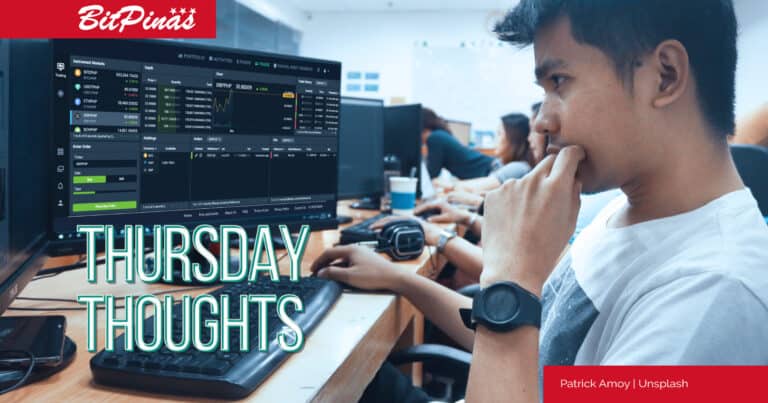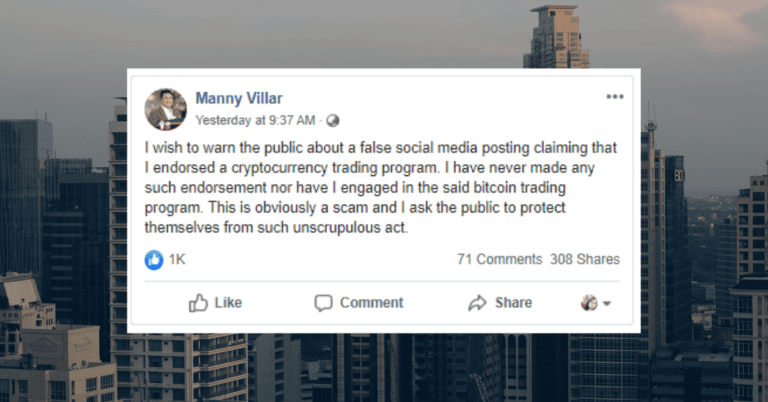Are Project Owners and Influencers Responsible for an NFT Rug Pull?
Developers & influencers have the civil liability to be responsible for those who fell victims, no matter the reason behind the rug pull.

Following the shutdown of Lele Gold Farm, a mobile application that was found to be operating as a Ponzi scheme (as per the SEC advisory), the question of influencer responsibility has come to the forefront. Many content creators and streamers promoted the illegal investment scheme to their followers, raising the question of whether they should be held accountable if a project they promote "rug pulls" or suddenly shuts down. This article, originally published on May 22, 2022, takes a closer look at the issue of influencer responsibility in the context of investment schemes and illegal activities.
By Nath Cajuday
Atty. Padilla Warns NFT Project Founders, Promoters in Potential Liability
“It’s not true na because NFT is unregulated, therefore, if somebody rug pulled, because it is world wide web, better luck next time, that’s not true, those who are involved in that scam are criminally and civilly liable for such fraudulent activity.”
Atty. Rafael Padilla, a lawyer who specializes in fintech and crypto, said during a BitPinas Twitter Space on March 25, 2022 that the owners, founders, and influencers of non-fungible token (NFT) projects are not responsible for “rug pulls” (sudden and unexpected shut downs). He stated that it is not the NFTs themselves that are regulated by the government, but rather the activities or uses related to them.
- Part 1: What is the Current State of NFT-related Laws in the Philippines?
- Part 2: Are NFT Art and Collectibles Considered Security?
- Part 3: Should Filipino NFT Projects Just Register Abroad?
What is a Rug Pull?
Rug-pulls are essentially schemes wherein a developer creates a project, promotes it to investors, and disappears with most (if not all) of its profit.
“But when it comes to rug pull, it is not accurate to say that it is regulated – it is prohibited. Under the Revised Penal Code provisions on Estafa and even under the Anti-Fraud provisions of the Securities Regulations Code, considering that these NFTs, on how they are sold, are securities, may habol ka, malinaw ‘yan sa batas.”
[“But when it comes to rug pull, it is not accurate to say that it is regulated – it is prohibited. Under the Revised Penal Code provisions on Estafa and even under the Anti-Fraud provisions of the Securities Regulations Code, considering that these NFTs, on how they are sold, are securities, you have rights to sue them, that is clear on our law.”]
Responsibility of NFT Project Owners and Founders
According to the commercial lawyer, if a rug pull happened, developers and founders have the civil liability to be responsible for the buyers who fell victim to the project, no matter the reason behind the rug pull.
“And that is where the Terms of Service is very important, because that basically defines your contract.”
Padilla added that it will be better if an NFT project has special formal written contracts to its clients but insisted that it is not common in the space.
In addition, he warned that if a contact does not have its Terms of Service, then it will not be a good indication.
“Importante, take a look into the Terms of Service because that basically defines what rights you have, and you have rights.”
[“What is important is to take a look into the Terms of Service because that basically defines what rights you have, and you have rights.”]
Responsibility of NFT Project Promoters and Influencers
“Ngayon, very theoretical ‘yung potential liability ng influencers. We’d like to think that they should have some ethical liabilities, pero ‘yung legal responsibility nila, hindi pa klaro sa batas.”
[“Right now, the potential liability of influencers is very theoretical. We would like to think that they should have some ethical liabilities, but their legal responsibility, that is not yet clear in the law.”]
Padilla clarified that if this scenario will be an issue in the court, it will be questionable if it will be resolved because it is still relatively unprecedented here in the country.
“I would like to think that under our laws on torts, not contractual liability, I really think that influencers who are involved in selling an NFT did not do their due diligence, can be held liable under the Law on Torts.”
The Law on Torts on NFT
The Law on Torts is a concept where somebody is held liable even in the absence of contract.
The lawyer also added that he can see that the policymakers in the country will soon regulate the activities of influencers.
Insisting that it is possible that the law will soon require influencers to post the necessary disclaimers and also to conduct due diligence when it comes to the projects or products that they promote.
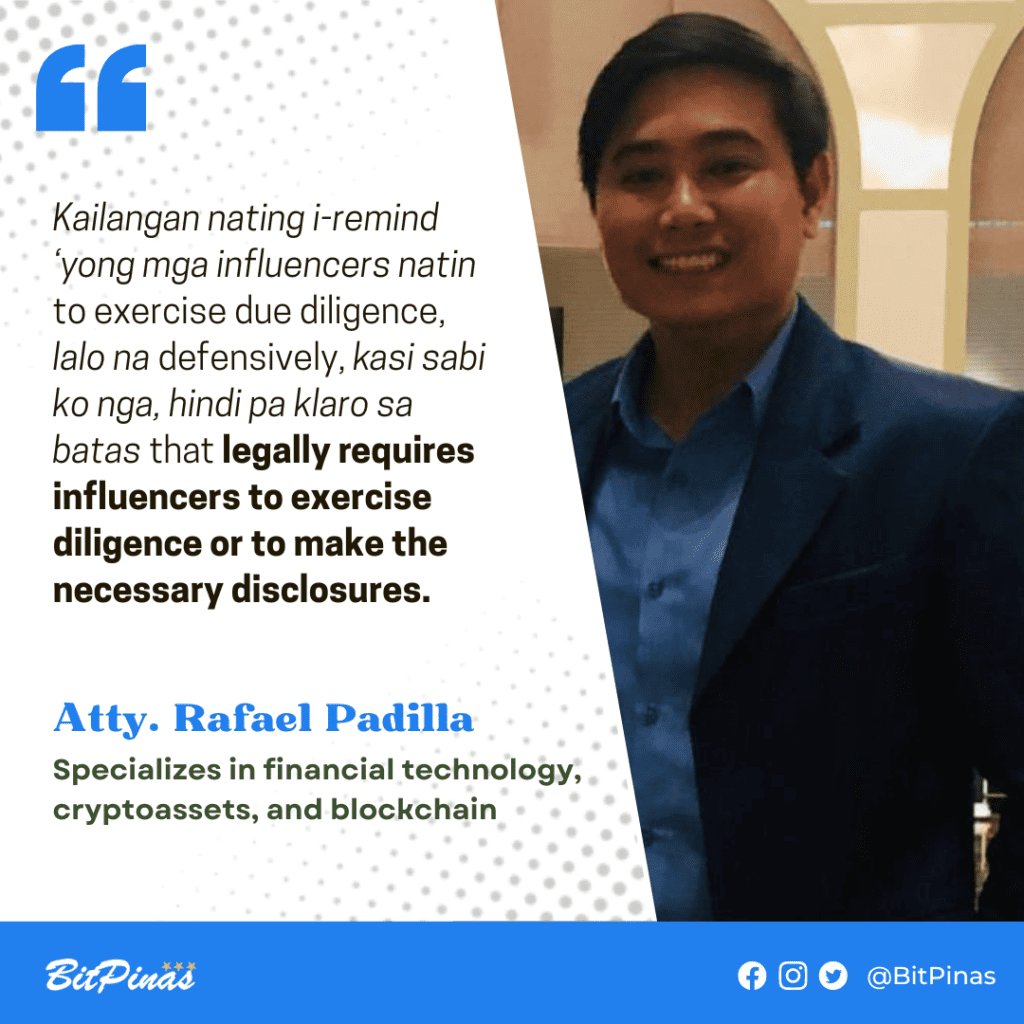
Meanwhile, known blockchain game Axie Infinity content creator, Kookoo Crypto, also added his insights about the matter, agreeing that influencers should really have legal liability. “Kailangan natin ng regulations to avoid ‘yung mga tao na pumasok sa mga projects na careless(ly) ipinromote ng mga infuencers,” he expressed.
[“…we need regulations to prevent people or consumers from purchasing projects that were carelessly promoted by the influencers.”]
In conclusion, Padilla sent messages to the three sectors involved in NFT projects:
To the influencers: Kailangan nating i-remind ‘yung mga influencers natin to exercise due diligence, lalo na defensively, kasi sabi ko nga, hindi pa klaro sa batas that legally requires influencers to exercise diligence or to make the necessary disclosures.
[We need to remind influencers to exercise due diligence, especially defensive diligence, because, again I say, it is not yet clear in the law that legally requires influencers to exercise diligence or to make the necessary disclosures.]
To the investors: From the perspective ng investors, I think kailangan din nating mag-exercise ng discretion dito, diligence, ‘di lang tayo magre-rely sa influence ng influencers.
[From the perspective of investors, I think we need to exercise our discretion and diligence; we should not just rely on the influence of influencers.]
To the consumers: Mag-ingat tayo at ‘wag lang umasa na dahil lang ini-endorse ng influencer, eh bibilhin na natin ‘no.
[Let us be careful and do not expect that just because a product is endorsed by the influencer, then we should buy it.]
This article is published on BitPinas: Are Project Owners and Influencers Responsible for an NFT Rug Pull?
Disclaimer: BitPinas articles and its external content are not financial advice. The team serves to deliver independent, unbiased news to provide information for Philippine-crypto and beyond.
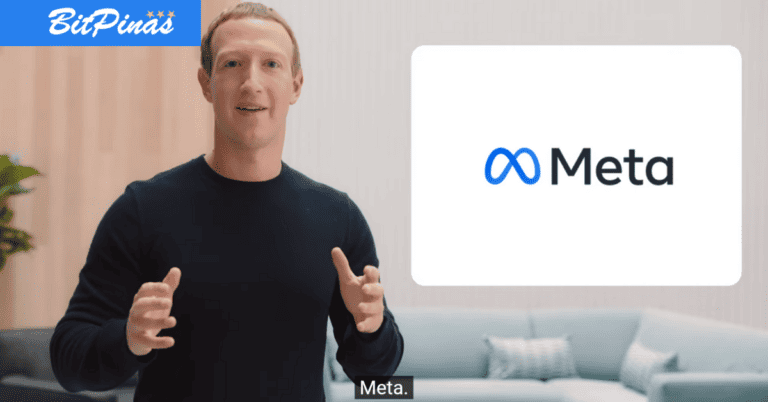

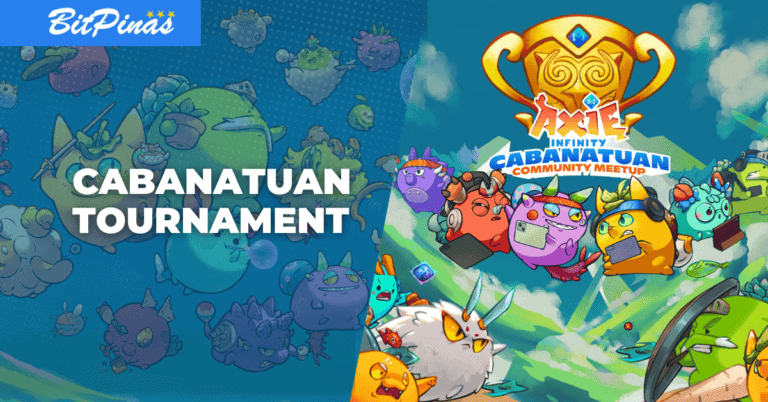
![[Twitter Space Recap] Metasports Co-Founder Outlines Kusho World Revival Strategy 6 [Twitter Space Recap] Metasports Co-Founder Outlines Kusho World Revival Strategy](https://bitpinas.com/wp-content/uploads/2023/04/kusho-2-768x402.png)
